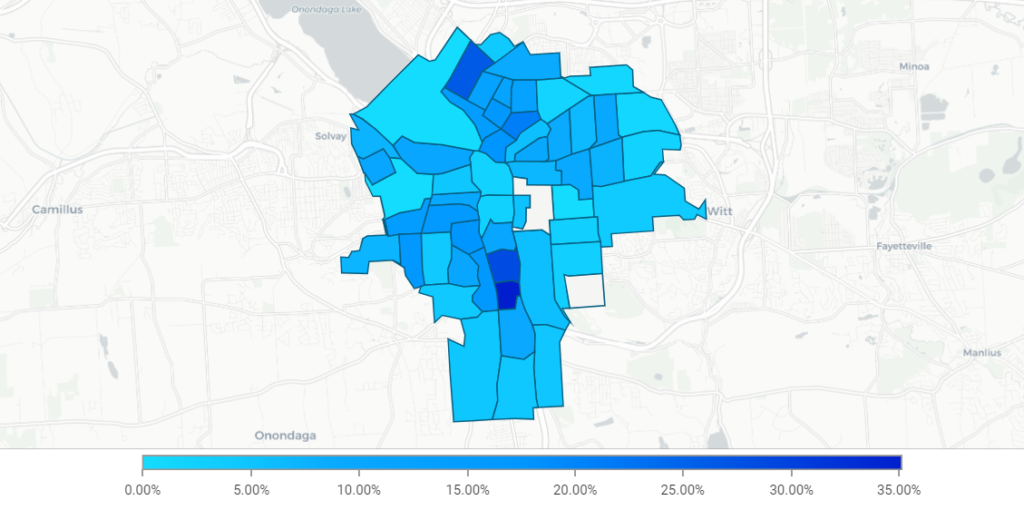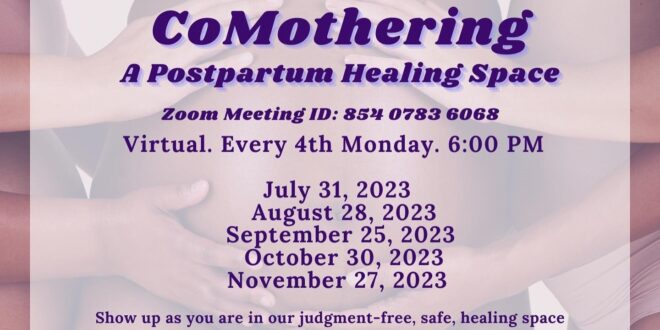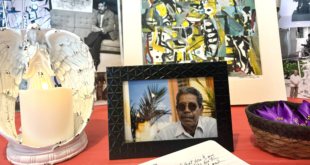The Sankofa Doula Collective is striving to improve prenatal and postpartum care through lead awareness in Syracuse.
By Sarah Merke
After eight months of developing proposals and presenting them to the community, the day had come. On a sunny spring day, Syracuse residents gathered to vote and select the proposal that best served the city’s dire need to tackle lead poisoning.
Their decision would steer hundreds of thousands of dollars in funding to a hopeful nonprofit, and would mark the end of a novel process designed to let the public direct such a substantial sum.
It was 9 a.m., May 2, and the polls had opened. The room began to fill with folks who had been a part of the process from the very beginning, along with curious community members who wanted to make a difference. All were eager to cast their votes. Hours passed as more voters arrived and packed the room. As the time approached 9 p.m., everyone watched with anticipation as the final vote was cast.
The counting of the 482 votes began, and with 181 votes the Sankofa Community-Based Doula Care and Lead Awareness Expansion Project won. The vote won Village Birth International & Sankofa Reproductive Health & Healing Center $150,000 to fulfill their lead awareness and prevention initiatives, including upcoming events at the end of October and November.
“We cried, in that moment we felt validated and loved by our community members voting for us,” said Asteir Bey, co-director of Village Birth International and co-founder of Sankofa Reproductive Health and Healing Center. “It was confirmation of the work that we do, when we submitted our proposal we didn’t think about winning or losing, we just knew our community needed this.”
The grant was in partnership with The Central New York Foundation, which aimed to support the community request for lead awareness after looking at the data received by a Life Needs Assessment survey. In partnership with FOCUS Greater Syracuse, the survey was used to better understand the needs of local residents. The data showed that lead was a major concern, with close to 50% of respondents stating their child or home had not been tested for lead. Elevated levels of lead found in Black children is significantly higher than children of other races in Syracuse for a magnitude of reasons such as housing.
The Central New York Foundation has been committed to the safety of children through its LeadSafeCNY initiative and has invested more than $2 million in lead prevention since its start in 2017. Although the Sankofa Community-Based Doula Care and Lead Awareness Expansion Project won the vote, LeadSafeCNY funding portions of the other applicants’ proposals: United Way’s Rideshare Lyft program, The Syracuse Peacemaking Project’s Lead awareness and neighborhood leader program, and BABY B.A.C.K, Inc.’s Lead Prevention PSA and quiz contest.”

This year marked a new beginning for The Central New York Foundation as this was its first participatory budget project, as described by Qiana Williams, program officer of Community Engagement at the Central New York Community Foundation.
“It’s part of our commitment to racial equity, to try different methods in our community that will make fundamental changes,” Williams said. “This year we had community members make decisions about how funds would be allocated within the community.”
Lead poisoning is 100% preventable, according to the Centers for Disease Control and Prevention, yet Syracuse residents, especially children, are still struggling with elevated levels of lead found in their blood. The COVID-19 pandemic played a significant role as it affected access to testing, maintenance of lead inspections of homes and the repairs needed. Staying indoors increased the risk of lead poisoning as many of the homes in Syracuse were built before 1978 meaning they contain lead-based paint, according to the city’s website.
Debra Lewis, program coordinator for the Onondaga Health Department’s lead poisoning prevention program, participated early on in the participatory budget meetings.
“If we can get in there earlier and prevent the exposure in the first place, children have the ability to grow into their full potential,” she said. “That’s what motivates me, that’s why I’m in the room, asking people to help us reach our goal of working ourselves out of business.”
Socio-economic issues in Syracuse contribute to the disproportionate rates of lead detected in Black children. Data provided by the Onondaga Health Department shows Black children have 10.9% of elevated blood levels in comparison to white children who tested at 1.8%.
“If you took any socio-economic and social justice indicator, and you layer those indicators over the same map that you do for elevated blood lead test results, it would mirror what we see in the city,” Lewis said. “The area that you’re seeing from 13203 that swoops down around 13205 have the highest number of rental properties, the highest number of children living in poverty, the highest utilization of safety net services, and the highest concentration of non-white people living in rental housing.”
These zip codes are the same areas where the Sankofa Community-Based Doula Care and Lead Awareness Expansion Project is committed to raising awareness among pregnant mothers and families of the dangers of lead. The Sankofa Reproductive Health and Healing Center is made up of the Sankofa Doula Collective: Doula 4 a Queen, Village Birth International, zenG Wellness, and other doula organizations. The collective is infusing lead awareness education into a multitude of events including “CoMothering-A Postpartum Healing Space,” which emphasizes the importance of providing mothers with the tools and knowledge needed after birth. A 2022 CDC report found that 53% of pregnancy-related deaths occurred between seven days to one year postpartum. “CoMothering-A Postpartum Healing Space” will be offering two more sessions on Oct. 30, 2023, and Nov. 27, 2023.
“Our role as community-based doulas is to really step in and support families at home and make sure that they are recognizing signs and also getting the care that they need as they usher in new life and heal from childbirth and take care of their family,” said Bey.
The Sankofa Doula Collective is working on coordinating lead testing dates and locations for the community in partnership with the Onondaga County Health Department.
Community members can visit the Sankofa Resource Wellness Center located at 2331 S Salina St. every Wednesday to pick up free diapers, clothes, prenatal vitamins and other items for families. The Sankofa Doula Collective has also started training a number of doulas on how they can talk about lead prevention and awareness to families in the community.
“The work of community health is about building relationships with families. It’s about educating them and empowering them to make decisions that will protect them from the stressors,” SeQuoia Kemp, founder of Doula 4 a Queen said. “It’s sad because there are a lot of resources and a lot of research out there and we hope to close that gap between the people getting tested and those who do not know what to do if their child has lead poisoning.”
 The Stand
The Stand


